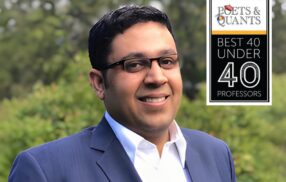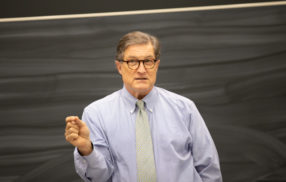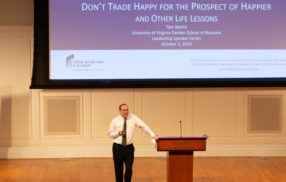
UVA Darden Professors Examine Fed’s Extraordinary Response to Coronavirus Crisis
By Dave Hendrick
Amid a unique economic and public health crisis, lessons learned and capabilities gained in previous crises are informing the dramatic actions taken by the U.S. Federal Reserve.
In a recent webinar hosted by the University of Virginia Darden School of Business and moderated by JP Morgan Private Bank Managing Director Jonathan England (MBA ’06), Professors Frank Warnock and Kinda Hachem outlined the extraordinary measures the Fed has taken to keep key aspects of the economy functioning during the coronavirus crisis, as well as additional tools the central bank may use as the crisis continues.
Warnock, a former senior economist at the Fed, said that while the economic numbers associated with the still-unfolding crisis were stunning, it was important to frame the events as a global public health crisis, with the economic shocks part of the fallout.
“Let’s keep in mind the nature of the crisis. It’s different than past crises,” said Warnock. “This is different than the savings and loan crisis and different than in 2008 when the crisis started in the financial system. This is a public health emergency.”
As such, the “stunning” economic numbers so far associated with the crisis, including projections of negative GDP growth and unemployment figures in the U.S. exceeding 22 million people, are both expected and to some degree a necessary, although painful, consequence.
“The public health response is to shut down portions of the economy,” said Warnock. “If that’s the response, you should expect to see stunning numbers. That’s not a weakness — that’s by design so we’re stronger going forward.”
Indeed, Hachem, a faculty research fellow at the National Bureau of Economic Research, characterized the downturn as a “medically induced coma.” The Fed’s response, in turn, has been to provide “life support” to the economy, seeking to enable the flow of credit to households and businesses in a variety of ways.
“The overarching goal is to keep the flow of funds going,” said Hachem, dividing the Fed’s support into two groups: the actions the body can take under normal circumstances and its more extensive capacities under emergency powers granted under Section 13 (3) of the Federal Reserve Act.
In typical times, the Fed could be expected to inject money into the federal funds market and drive the federal funds rate to zero in an effort to ease lending among financial institutions.
The more targeted tactics under Section 13 (3) include supplying liquidity to banks to, for instance, lend to small businesses under the Paycheck Protection Program.
In addition to supporting banks and financial markets, the Fed has moved to essentially begin lending directly to small and medium-sized firms through the Main Street Lending Program.
“The banks will make the loan, but the Fed will take on the exposure, and there’s collateral from the Treasury so that the Fed is not knowingly taking on credit risk,” said Hachem. “I think that’s the [program] economists are the most excited about, because it has the potential to very pointedly direct funding to the places that need it most acutely.”
A Difficult Task: Judging the Success of Fed Programs
Hachem said the temptation to compare the success of Fed actions within a pandemic-altered economic backdrop to a backdrop of a normally functioning economy should be avoided.
So long as public-health responses like social distancing and shelter in place are widely practiced, the myriad Fed programs cannot be expected to produce a fully functioning economy. Rather, they are attempts to maintain the necessary foundation to allow a return to economic health once the public health crisis eases.
“Yes, we might have 20 percent unemployment while the Fed is expanding its balance sheet by trillions of dollars, but as long as we’re in a medically induced coma, that’s not telling you that the Fed has failed,” said Hachem, adding that the ability for the economy to rebound once the public health responses are eased will be a truer measure of the effectiveness of Fed actions.
On Future Inflation Risk and the Possibility of Negative Interest Rates
Answering a series of Darden alumni questions, Warnock said inflation will likely not be a concern until the coronavirus has been subdued and the Fed is ready to move on to managing long-term risk.
“I think inflation is the most benign of the long-term risks, in that when we get there, we’ve succeeded,” said Warnock. “The patient has survived, and now we’re starting to have problems from too much liquidity and too much demand and inflation goes up.”
While the prospect of moving to negative interest rates, as some other countries did during the depths of the global financial crisis, has been floated as one tactic, Hachem and Warnock questioned the usefulness of the move, suggesting it brought risk with questionable gain.
“From an economics perspective, there is no reason why that would be preferable to just directly providing money in long-term markets,” said Hachem. “In fact, it could be detrimental.”
Similarly, Warnock questioned why the Fed would take a “step into the unknown” down a path that has shown limited success elsewhere.
“Prudence would say, ‘Why bother?’” said Warnock. “It doesn’t mean they won’t, but there are better tools for what they are trying to do.”
As to when the public health crisis may be contained, the Darden professors suggested rapid, widespread testing appears to be a key prerequisite to a return to normalcy.
The University of Virginia Darden School of Business prepares responsible global leaders through unparalleled transformational learning experiences. Darden’s graduate degree programs (MBA, MSBA and Ph.D.) and Executive Education & Lifelong Learning programs offered by the Darden School Foundation set the stage for a lifetime of career advancement and impact. Darden’s top-ranked faculty, renowned for teaching excellence, inspires and shapes modern business leadership worldwide through research, thought leadership and business publishing. Darden has Grounds in Charlottesville, Virginia, and the Washington, D.C., area and a global community that includes 18,000 alumni in 90 countries. Darden was established in 1955 at the University of Virginia, a top public university founded by Thomas Jefferson in 1819 in Charlottesville, Virginia.
Press Contact
Molly Mitchell
Associate Director of Content Marketing and Social Media
Darden School of Business
University of Virginia
MitchellM@darden.virginia.edu






